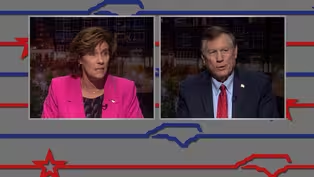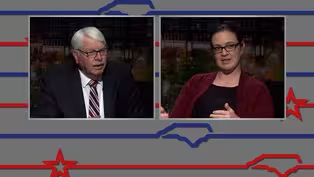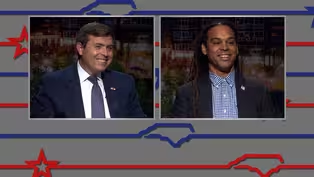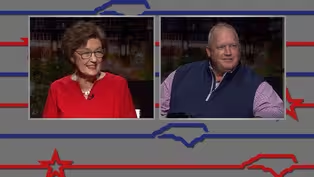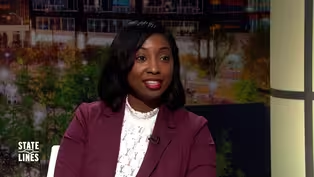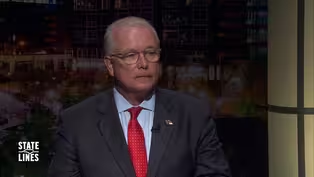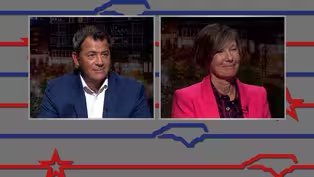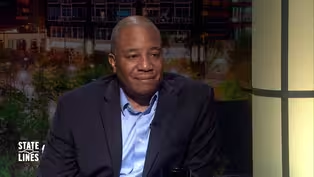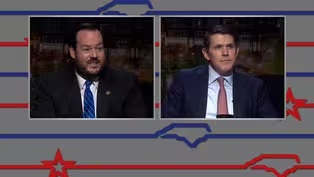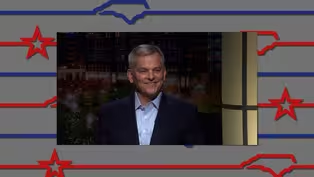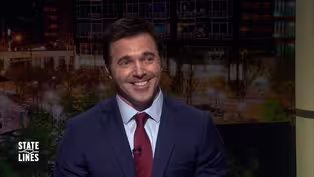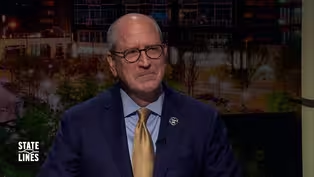
Michele Morrow, Republican Candidate for NC Superintendent of Public Instruction
Special | 12m 57sVideo has Closed Captions
An interview with Michele Morrow, GOP candidate for NC Superintendent of Public Instruction (2024).
Michele Morrow is running as a Republican for North Carolina's Superintendent of Public Instruction. She discusses her 2024 campaign with PBS NC's Kelly McCullen. This interview was recorded on Thursday, August 29, 2024.
Problems playing video? | Closed Captioning Feedback
Problems playing video? | Closed Captioning Feedback
State Lines is a local public television program presented by PBS NC

Michele Morrow, Republican Candidate for NC Superintendent of Public Instruction
Special | 12m 57sVideo has Closed Captions
Michele Morrow is running as a Republican for North Carolina's Superintendent of Public Instruction. She discusses her 2024 campaign with PBS NC's Kelly McCullen. This interview was recorded on Thursday, August 29, 2024.
Problems playing video? | Closed Captioning Feedback
How to Watch State Lines
State Lines is available to stream on pbs.org and the free PBS App, available on iPhone, Apple TV, Android TV, Android smartphones, Amazon Fire TV, Amazon Fire Tablet, Roku, Samsung Smart TV, and Vizio.
Providing Support for PBS.org
Learn Moreabout PBS online sponsorshipMore from This Collection
During major election cycles, PBS North Carolina's public affairs team sits down for in-depth conversations with candidates running for Governor and Council of State positions. PBS North Carolina has invited major party candidates to a one-on-one interview with State Lines host and executive producer Kelly McCullen. Interviews are scheduled throughout the summer.
2024 NC Commissioner of Insurance Candidates
Video has Closed Captions
Mike Causey (R) and Natasha Marcus (D) discuss their campaigns for NC Commissioner of Insurance. (26m 46s)
2024 NC Commissioner of Agriculture Candidates
Video has Closed Captions
Sarah Taber (D) and Steve Troxler (R) discuss their campaigns for NC Commissioner of Agriculture. (26m 46s)
2024 NC Commissioner of Labor Candidates
Video has Closed Captions
Luke Farley (R) and Braxton Winston II (D) discuss their campaigns for NC Commissioner of Labor. (26m 46s)
2024 NC Secretary of State Candidates
Video has Closed Captions
Elaine Marshall (D) and Chad Brown (R) discuss their campaigns for NC Secretary of State. (26m 46s)
Jessica Holmes, Democratic Candidate for NC Auditor
Video has Closed Captions
An interview with Jessica Holmes, Democratic candidate for NC Auditor (2024). (12m 32s)
Dave Boliek, Republican Candidate for NC Auditor
Video has Closed Captions
An interview with Dave Boliek, Republican candidate for NC Auditor (2024). (12m 58s)
2024 NC Lieutenant Governor Candidates
Video has Closed Captions
Hal Weatherman (R) and Rachel Hunt (D) discuss their campaigns for NC Lieutenant Governor. (26m 46s)
Maurice "Mo" Green, Democratic Candidate for NC Superintendent of Public Instruction
Video has Closed Captions
An interview with Mo Green, Democratic candidate for NC Superintendent of Public Instruction (2024). (13m 7s)
Video has Closed Captions
Wesley Harris (D) and Brad Briner (R) discuss their campaigns for NC Treasurer. (26m 46s)
Video has Closed Captions
Josh Stein (D) discusses his campaign for NC Governor. (26m 46s)
Jeff Jackson, Democratic Candidate for NC Attorney General
Video has Closed Captions
An interview with Jeff Jackson, Democratic candidate for NC Attorney General (2024). (12m 50s)
Dan Bishop, Republican Candidate for NC Attorney General
Video has Closed Captions
An interview with Dan Bishop, Republican candidate for NC Attorney General (2024). (12m 44s)
Providing Support for PBS.org
Learn Moreabout PBS online sponsorship[dramatic music] - Let's welcome to the "State Lines" set Michele Morrow, the Republican nominee for State Superintendent of Public Instruction.
Ms. Morrow, welcome to the show.
Welcome to the set.
Good to have you.
- Thank you so much.
- I ask this of everyone, because voter identification of candidates across North Carolina, if you're not in the governor's race or running for president, seems to be quite low as a percentage.
Who is Michele Morrow?
What made you seek the superintendent's role in 2024?
- I am a very concerned citizen.
I'm a mom, I'm a nurse, I've been a teacher, and I've been an advocate for children for the last eight years here in North Carolina.
And I am tired of a failed system that is not providing the sound, basic moral education that's promised every student in this state.
- You said basic moral education.
I've heard of the basic sound education.
Is there a difference in that, in your opinion?
- Absolutely, if you read what we're talking about, about what should be taught in our classrooms and what should not be taught, there's absolutely a responsibility that we are teaching our children character and integrity issues as well as academic prowess.
- Tell us about the character education, do you have a policy as part of your plank of ideas out there?
How do you infuse that into the public school system and around all the other classes, 'cause you have STEM and things of that nature that are a priority in the era of subsidized testing?
- You know, back in the early 2000s, there was a push that we were going to focus on character development.
And so, every month our schools would take a character trait and they would describe it and they would read books about people that were, you know, were examples of it and children would write about it, and I think we need to return to that.
Things like honesty and hard work and perseverance and respectfulness.
- Let me ask you about your experience with the public schools as a mom and as someone who's been in advocacy for education, if not public education, what has been your brushes with the public education system?
- I have five children and they have all been in public, private, and homeschool at different points in their career.
Now, four of my children have graduated and moved on and they're working, and my last is in seventh grade.
So, I have a child that had an IEP, had issues, and so, we were in the public school system for four years and I fought that and the reason why I actually, took that child home is she was not getting the education she needed.
So, we are the poster family for school choice.
- When it comes to public ed, you look at that, when you say you weren't served well, do you go to the teacher level and go, those teachers didn't serve me well or is it a system that isn't serving parents and how well is the system serving parents and teachers and employees?
- It is absolutely a broken system and that's why I'm running, because we cannot have more of the same.
We have got to get the US Department of Education out of our state and we need to focus on academic excellence, career preparedness, and bringing safety and discipline into every classroom in North Carolina.
- What's wrong with the US Department of Education?
I've heard this in prior presidential cycles mainly, but you're bringing it out there.
What's wrong with federal money, with federal influence over state education?
- Well, there's nothing wrong with federal money in that it comes from all of our pockets.
What's wrong is when they demand that we do things that are dividing our students by the color of their skin that are defining the United States and somewhat that's inherently racist or that they're saying that capitalism is the reason for all of the ills in the world and that socialism is the direction that our country should go.
- Is there an example, are you seeing in certain classes is it in history, is it in geography, is it in math?
Where are you seeing the lines of academic teaching that have brought you into this race in an effort to change or reform?
- Well, really when I ran for school board two years ago, I was exposing the fact that there is not only sexually explicit content in our public libraries, but there's also very graphically violent content as well.
And there were trainings for teachers that are CRT trainings.
They don't call it that anymore, but they are basically, telling teachers that you need to apologize, you need to uncover your unconscious bias.
We were finding different curriculum that they were talking to three-year-olds in pre-K classes and discussing the fact that our value and our future is determined by the color of their skin.
That's abject racism and it has no place in North Carolina schools.
- Well, in Wake County, I would call it's a growing, but it's a big city school district.
A couple million families are in that triangle region.
There's a lot of rural schools out there.
What are you seeing in rural versus suburban versus urban schools?
- Well, I'm seeing in rural schools it's very hard to keep great teachers, because they're coming to the cities in order to get higher pay.
I was just at some fabulous schools yesterday actually.
I visited in Pender County and I believe that this is true.
In 2024, there is no excuse why every student in every zip code should not be getting an excellent education and career preparedness.
The stats tell us that only 38% of those graduating from high school are going to go on to a four-year degree.
What are we doing for that other 62% to prepare them to enter into the workforce or to enroll in our military?
- So, what are you going to do to influence them to do that?
'Cause obviously, it's a problem you've seen, solve that for us.
- Absolutely, the first thing we need to do is we must maintain that no child leaves fifth grade without mastering reading, writing, and math.
That is the basis on which all higher levels of learning happens.
And then we need to be exposing our children to different options.
I think we need to expand the CTE programs, the trades, and technical opportunities in junior and senior years.
And there are some really great, like I was just at Pender High School yesterday, they have an amazing CTE program and it is not only benefiting the students, it's benefiting their entire community, because it's enhancing those businesses and it's actually, making them more economically secure in Pender County.
- I've seen a lot of tech ed out there.
It's been around for decades in North County.
It does still seem to be working.
You're saying it's not working well enough.
What are you seeing?
Are you seeing more of like the early college high school where you get a two-year degree with your diploma?
Do you see an era where guidance counselors tell students maybe they don't need to go to, maybe they should consider other options in four-year universities?
There's a million things and I dealt with it way back in the day as well.
- Yeah, no, I really think the CTE programs that are in place are working very well.
The problem is that depending on what district you live in, you might be limited as to what your options are.
I would like to expand options so that regardless of where you live, and really we need to look at it as to your point.
We have very different demographics throughout the entire state of North Carolina.
So, I think especially, in these rural areas, we need to say what are the businesses that are thriving?
What is needed to ensure that this community is going to be able to continue to thrive?
And if we are training up the next generation to be able to work in these businesses, we might be able to attract more people from out of our state to come and to set up shop here in North Carolina rather than being attracted more so to all of the big cities.
- Yeah, let's wake up the teachers who might be watching this.
What about teacher pay in North Carolina across?
What do you do about that?
- Well, we absolutely need to treat our teachers like the professionals that they are.
And I think when we get out of the bureaucratic and political agendas that we are being forced upon, we are going to have the money to make sure that it's going to student success and absolutely to teachers and the resources in the classroom.
- How do you weigh that when you walk in, if you're elected superintendent, you've got the administration, you know, the superintendents who are gonna really deal with you, not teachers, maybe not even principals.
Do you separate those two forms of leaders and how do you work with both without picking a side, or can you pick a side to make reform?
- Well, I really think that the goal is that we get in and everyone that has the intention of student success, you're welcome at the table, right?
We're going to need people at all levels who really have the best interests of our students at heart.
And I think what needs to happen is to maintain that every law is obeyed regardless of what district you live in and that we are giving the resources to the classrooms, to the schools, so that our students can reach their fullest potential.
- If you move into an official position, there goes the bully pulpit and there goes the citizen advocate, because then you join that system.
You're going to inherit a huge building full of people who've dedicated their careers to public education.
What kinda leader are you, and what would you expect of them, what should they think of you?
- I am a servant leader.
I have been in many leadership roles and there's never a job that I will ask someone to do that I'm not willing to do myself.
And I'm also a mediator.
I absolutely am on board with anybody who has, as I said, the excellent education at their baseline.
I am not going to tolerate people that are going to push political agendas in our classrooms that are going to disobey parental rights, that are going to be using our children as a weapon of activism rather than teaching them how to think.
We don't wanna tell them what to think or what to feel any longer.
And I am excited, because this is an advocacy role and I disagree that I don't have a bully pulpit or I can't be an activist anymore.
In that, my activism is all about the people of North Carolina, it's all about the children of our state, and they need someone who's going to stand up.
I do not intend to serve the system.
I intend to serve the students.
- I've heard some chatter about incorporating some faith-based learning into public education.
Where do you stand on that I saw an article float by, it was like a one-day event.
Do you believe there's a place for faith in the school?
Should we keep it everything nice and clean to reading, writing, and arithmetic?
- I absolutely believe that in middle school and high school, that we should have elective Bible classes being taught as a historical reference.
Being taught as the basis of how we became the United States of America and the constitutional reality of how we even got the greatest government document ever written.
So, absolutely, we should give children that opportunity.
And most people don't recognize, our students absolutely have their First Amendment rights and they can discuss, they can write about, they can do projects on anything that is close to their heart and anything that they care about.
Now, we can't have our teachers proselytizing, right, as state employees, but our students need to be released to be able to talk about and to invest in and to be who they are.
And faith is a huge part of who we are as human beings.
- You're a mother that's been in that fight against school boards of running for local school boards, but if you're state superintendent, how do you manage the parents?
Because once the emotions get going in the education space, it does get outta control.
- It does.
- [Kelly] How do you manage that, because all of a sudden you're on the other side of that microphone.
- Well, you know, I really had some fabulous conversations, even when I ran for school board.
And people that were very upset with me and very fearful that I did want to push my faith or whatever it might be, you know, onto their children.
And when we sat down and I would just say, "What is your real concern?
What do you really want to see solved?"
We could find common ground and that's what we need.
We need that civil dialogue, we need that, you know, that logical discussion, because I know from talking to people throughout the state of North Carolina, every parent wants the best for their children.
It doesn't matter your race, your religion, or your politics.
We are concerned that our children are not getting the education that they need to be able to pursue careers that are gonna be, you know, not only make them financially independent, but also gonna be able to compete in this global marketplace that we find ourselves in.
- We know what Democrats are thinking, but you have to deal with Republicans, if elected.
What do you say to the ones, the ones that like you are on board, but there's a lot out there, more establishment I say, who might be skeptical of a Michele Morrow administration?
What do you say to them once you get to Raleigh?
How do you work with them?
That'll be our last question.
- Well, I have to say I have a really great relationship with most of the members of the K through 12 Senate Committee as well as the House Committee, because I've been there for the last six years and I am a solutions-oriented person.
This is not about me personally, this is about the issues and this is about ensuring that our students are safe, that they're educated, and that they are prepared to be successful as adults.
- Michele Morrow, Republican nominee for State Superintendent of Public Instruction in North Carolina.
Thanks for coming on "State Lines".
Excellent interview, appreciate it.
- Thank you so much.
- Safe travels.
I say to all the candidates, be safe out there.
[dramatic music] [dramatic music continues]

- News and Public Affairs

Top journalists deliver compelling original analysis of the hour's headlines.

- News and Public Affairs

FRONTLINE is investigative journalism that questions, explains and changes our world.












Support for PBS provided by:
State Lines is a local public television program presented by PBS NC
